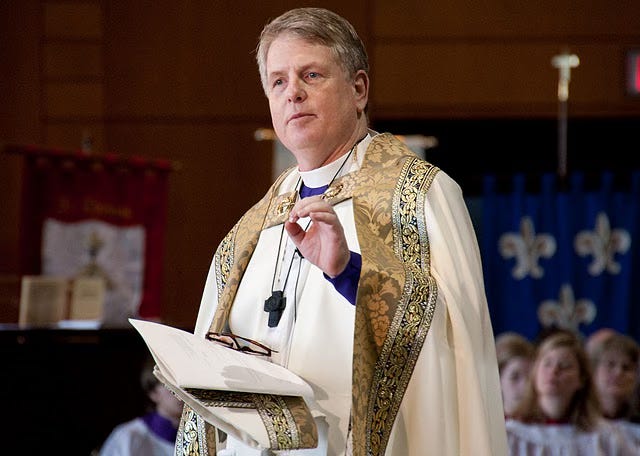Here is a conversation I had with Bishop Scott Anson Benhase, author of Done and Left Undone, which you should definitely check out.
Here is the nugget I read from him that is worth its weight in gold:
“Years ago when I was recruiting at one of our seminaries, I ended each interview by doing a role-play with them. I’d play who I was (minus being a bishop), a 50-something, over-educated, occasionally-pissant, straight white male. I asked each seminarian to tell me why I should join their church.
They all mentioned community. I said I attended AA. I had all the needed support. They mentioned outreach opportunities. I replied I was an active member of Rotary. I was already fully involved in helping needy folk. Lastly, they mentioned the glorious music program at their church. I responded I had season tickets to the local symphony. I already enjoyed plenty of great music. I waited patiently for some mention of how their church could meet my greatest need, namely, to be reconciled with God through Jesus by his cross. Never came. One did mention Jesus would be a good exemplar for my life, so I gave him points for that. Church leaders aren’t social directors, community service providers, or music impresarios. We got one thing and one thing only: God’s grace in Jesus. We’re stewards of the Great Narrative of Redemption. When we busy ourselves with other tasks, we’ll lead, but it won’t be missional leadership. My friend Paul Zahl told me that every church he’s ever seen or been part of that’s led with “Jesus Christ and him crucified” has grown. That’s been my experience, too. As Stephen Covey has said about organizations: “The main thing is to keep the main thing, the main thing.”
Show Notes
Summary
In this conversation, Scott Benhase discusses the challenges and responsibilities of church leadership, particularly during times of crisis. He emphasizes the importance of slowing down, listening, and fostering spiritual maturity among congregants. Drawing from his experiences and the Benedictine tradition, he highlights the need for empathy, humility, and perspective in pastoral care. The discussion also touches on the concept of a 'full gospel church' that balances social action with spiritual growth. In this conversation, Scott Benhase discusses the challenges and dynamics of church leadership, particularly in the context of faith education, outreach, and the complexities of navigating disagreements within congregations. He emphasizes the importance of understanding congregational needs, maintaining relationships with those who hold differing views, and the necessity of reconciliation in the face of conflict. Benhase also reflects on the role of the church in a post-Christian world and the significance of a Benedictine approach to ministry, highlighting the need for a focus on God's grace and the core message of reconciliation through Jesus Christ.
Takeaways
The church often pulls leaders back in, even after retirement.
In times of upheaval, slowing down is crucial for healing.
Listening first and speaking second is essential in conflict resolution.
Many congregants lack spiritual maturity and self-awareness.
Benedictine leadership emphasizes responsibility for one's spiritual life.
Empathy must be balanced with objective distance in pastoral care.
Humility is recognizing one's own flaws while leading others.
A full gospel church integrates social action with spiritual growth.
Pastoral leadership is an absurd vocation that requires faith.
Cultural nihilism stems from a lack of belief in redemption. There was no teaching the faith of the church that was going on.
You want to begin with where things are.
Don't demonize folks who disagree with you.
Don't cut off from people who disagree with you.
It's a brave space to be.
We're beginning to see the other as not enemy.
Keep the main thing the main thing.
Our atonement theology is so flaccid and so weak.
God has something to say to them that is a word of mercy.
I need you.
Sound Bites
"The church is kind of like the mafia."
"Slow things down because people are highly reactive."
"Listen first and speak second."
"There's no Bible study, no teaching the faith."
"Don't demonize folks who disagree with you."
"Don't cut off from people who disagree with you."















Share this post